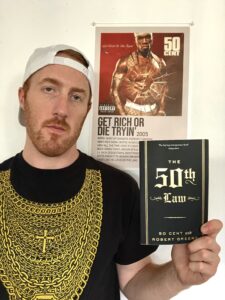 We all have fears. Will we get a good job? Will we find love? Will we ever make it out of our current situation in life and achieve something different, something better? The future is perpetually uncertain, and our anxieties about its various potentialities can cause us to make poor decisions in the present. We often let our fears inhibit us and cloud our judgment.
We all have fears. Will we get a good job? Will we find love? Will we ever make it out of our current situation in life and achieve something different, something better? The future is perpetually uncertain, and our anxieties about its various potentialities can cause us to make poor decisions in the present. We often let our fears inhibit us and cloud our judgment.
When we are born, our very first emotion is fear. As newborn babies, we have no control over any aspect of our lives, and we are inherently scared that our needs will not be met. Fear is our first reaction to life, the “oldest and strongest emotion known to man, something deeply inscribed in our nervous system and subconscious.” Out of this fear, babies necessarily make everyone else cater to their needs and desires. They cry, and mom (or dad) comes running with the food or diaper change. Because of this, fear becomes something that we try to assuage and avoid, an uncomfortable feeling that must be mitigated.
There is another way, however, one examined and expounded upon by rapper-entrepreneur 50 Cent and writer Robert Greene in this co-authored book: accept our fears, embrace them, and make them work for us. The goal should not be to eliminate them, for that makes us soft. Instead, we must face them directly, with courage and strategy, and we will undoubtedly emerge from our trials and tribulations stronger.
Growing up in Queens, New York, 50 Cent never should have escaped the street life. His mother was murdered when he was only 8-years-old and he was on the corner selling drugs before puberty. How did he ever manage to make a name for himself in music and then business? He out-hustled the other young men on the corner, using a combination of savvy business schemes (like skimming product off the drugs he bought from his supplier in order to start his own hustling gig) and calculated violence (he once slashed a competitor’s face with a razor blade to send an intimidating message to the rest of the hood). By the age of 24, he had managed to sign a record deal with Colombia Records and his first album was set for release.
Despite this glimpse of freedom, in May of 2000, his street life caught up with him when a hired assassin fired nine bullets into his body from close range and left him for dead. Miraculously, he survived, only to be dropped by Colombia and see his future success go up in smoke. Did this stop the fearless 50? Absolutely not. It only made him work harder, for he had faced death and lived. He began an underground mixtape campaign on the streets of New York that led to Eminem and Dr. Dre signing him to their label only two short years later.
This book is broken down into ten chapters, each a different element of fearlessness, culminating in the ultimate fear: the confrontation of our own mortality. Each of these lessons is expanded upon via the stories of 50’s growth from a hustler on the streets of Queens to a platinum-selling rapper to a business entrepreneur, in addition to Greene’s analysis and inclusion of other relevant stories from history. It is a wonderful tapestry, with 50’s life used as the colors and patterns and Greene acting as the artist.
Today, 50 Cent is worth millions. He has sold tens of millions of records, performed around the world, invested in multiple companies including clothing, books, and beverages, and is currently executive producing multiple television shows. Every time life has intimidated him with its punishing unpredictability, he has taken the challenge head on and never doubted himself. He sees the harsh realities of his life for what they are and works within their parameters. Every time events turn to shit, he turns them in sugar.
50 Cent is living proof that if a simple street hustler from the hood can make it to the top, we can all improve our lives to the extent that we believe in ourselves, work our corners, and face our fears. After all, the “most intense form of self-belief is to feel a sense of destiny impelling you forward.” We must see things for what they are, master our crafts, and never stop moving forward. We must never let our fears stop us from action.
Franklin Delano Roosevelt was resoundingly right when he famously stated that the only thing we have to fear is fear itself.


